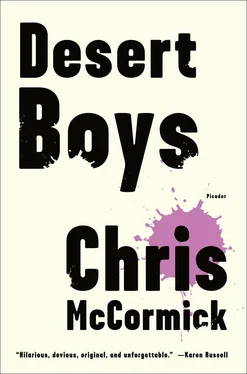But I was sitting at an outdoor café in a city on the rise with a man I was beginning to love. I wasn’t about to go back.
THE TALLEST TREES IN THE ANTELOPE VALLEY
I. BRIEF OVERVIEW OF AN EVOLVING CULTURE
The town became a city, and so on, but in the transition, there were elements of both, and I happened to be raised there during that period. In fact, depending on who’s telling the story, that transition still defines the place.
I’ll give you an example of each. On the city end of things, you started seeing department stores, courthouses, various public schools — in short, buildings with elevators and escalators. Our town was literally moving up. Bridges linked stretches of new highway over the anachronistic caterwauls of the railroad. And people were moving in, people from Los Angeles and its boroughs, people who’d been drawn to the cheap, carry-only-what-you-need, fresh-start sort of living the desert represented. People who’d been renting a one-bedroom apartment for the entirety of their financial lives woke up one morning and read the signs that the same amount of dollars and cents got you a modest, one-story home up north. Sure, the desert wasn’t L.A. But for the people who headed into my town — and they came then by the thousands — maybe not being L.A. was the most appealing thing about it.
Still, the place remained, and remains, a town in certain, immutable ways. To this day, alfalfa plants are farmed on the eastern fringe for cattle to eat, and their shoots come up in local markets for salad ingredients or else midday snacks for children. You’d make a friend in kindergarten and shake his hand at your high school graduation. You felt confident in the possibility that one day his son and your son together would hunt lizards in the heat. In school, they would be, like their fathers were, guided to the military, the police department, the fire department, or the farm. Most girls, as far as you could tell, longed for marriage and motherhood from the start. They taught children or else studied nursing while they waited for the inevitable shift in priority. Of course, these were suggestions, and suggestions only. If you didn’t follow the suggestions, there was still a place for you. It just seemed a lot lonelier a place.
Maybe the biggest indicator of its town-ness was the attitude of its citizens. The townspeople looked at the incoming flux of city folk — many of whom happened to be brown — with a slant and baleful eye. They worried about the future of the town, which, as all townspeople understand, depends on the character of its community. They didn’t trust people who seemed, in ways both obvious and imaginary, so different. It’s true that these townspeople were what some might call bigots, or at least a group of people who didn’t like seeing things change. But they were also no monolith. Some might say they were persons, not a people.
That’s why stories happen. That’s why this story happened.
II. ONE WAY TO GET A JOB AT TWELVE
The father of a kid I knew at school: His last name was Reuter — pronounced like the word “writer.” On account of divorce, his son didn’t share the name, and saw his dad only on occasions like birthdays and lazy weeks during the summer. I saw Mr. Reuter more often. He happened to be my neighbor.
We lived on a block of tract homes. On each block stood an assortment of ten or twelve homes from two or three types. The blueprints had been flipped here and there, and garage doors were painted in different colors to give the illusion of variety. I mowed lawns and pulled weeds for houses that weren’t inhabited by children who otherwise would be doing that work themselves.
Mr. Reuter had seen me one weekend in March getting the lines just right on my own front lawn. I should say it took most of my strength to get the job done. Everything about me at that time (and let’s be honest: at this time, too) was light. I was a lanky boy with a small head on a thin neck. My heels never touched down when I walked. I used to have to jump and come down on the mower with all my weight to get the front wheels up so I could pivot around the tree in the middle of the yard. Maybe he saw me do it that day. He headed over from his driveway across Comstock Avenue while I heaved the bag of grass over the lip of the compost bin.
“Looks good, smells good,” he said. Mr. Reuter must have been around the same age as my dad, but he looked much older. He had a full head of hair, but it was white and thin, and each silky strand of it seemed pluckable without much effort. He wore a pair of glasses with gold frames and these black rubber tips on the ends that hung below his enormous earlobes. He’d lost some weight since I’d last seen him, since before his wife and Drew moved out.
“You want me to do yours?” I asked. Back then I was always looking for business.
“No,” he said, drawing it out like we were talking on a porch someplace. “I plan on getting rid of my lawn altogether.”
I wasn’t surprised. In my limited but obsessive time as a semiprofessional landscaper, I’d learned how difficult and expensive it could be to keep a lawn in the Mojave Desert. You didn’t have to do yards for a living — you could take a walk through the neighborhood and see how many of the houses had put in limestone or gravel where the grass had been. Some of the newer neighbors from the city chose to neglect their yards altogether, letting the grass turn yellow like giving up, and the dirt that the home had been built on in the first place got to peek its head out again, in some places anyway.
“I’ve seen others do it,” I said. “I guess that means I won’t be getting your business, then?”
“Well, that’s not entirely true. Not if you want it, that is.”
“What’s the job?”
“I need a digger, a man to loosen up the soil. I’d do it myself, but I’m a bit past my prime. You’re skinny, but I’ve seen you working the neighborhood. You’ve got heart.”
“Anything more complicated than a shovel?”
“No sir. I figure it’ll take the sixty-six pounds of you about six weekends, six hours a day, to make it happen. There’s money, of course.”
“How much?”
“How much do you get paid to mow?”
“Twenty,” I said. The truth was I got paid five dollars a mow. I added: “Plus tips.”
“Well, how about that,” he said. “By any chance, are you hiring?”
I wanted to laugh, but I figured he’d know I was lying if I did.
“Look,” he said, “I’ve got trees coming in, is the thing. Big trees that’ll take up the whole yard. Half the cost is those guys coming in and prepping the land. I’m leaning on you for a discount. How’s fifty dollars for the project?”
Fifty dollars to a kid lands in that perfect range of inordinate yet fathomable, and has a lot of sway to make him do something without thinking too hard about it. I’d planned on continuing my negotiations, but the words “fifty dollars” spun me off my game. Immediately I agreed.
Mr. Reuter said his thanks and turned homeward. I finished unloading the mower’s bag, holding my breath as the loose dust and grass billowed out of the bin upon landing. I hooked the bag, infinitely lighter now, onto the mower again. From across the street, Mr. Reuter waved and smiled. Then he pulled on the red rope above his white head, lowering his garage door until it was shut.
Work hadn’t started. I hadn’t yet been paid a nickel. But already I felt it. That was the first time I sensed I owed him something.
III. SOME NOTES ON MY UNDERSTANDING OF ADULTS
Some children transcend their age with patience and understanding — an understanding that you have to go through this thing called childhood before anyone takes you seriously, before you’re empowered to drive change. I wasn’t one of those children. I was a child in every sense of the word, but mostly I was a child in that I felt nothing like a child.
Читать дальше












